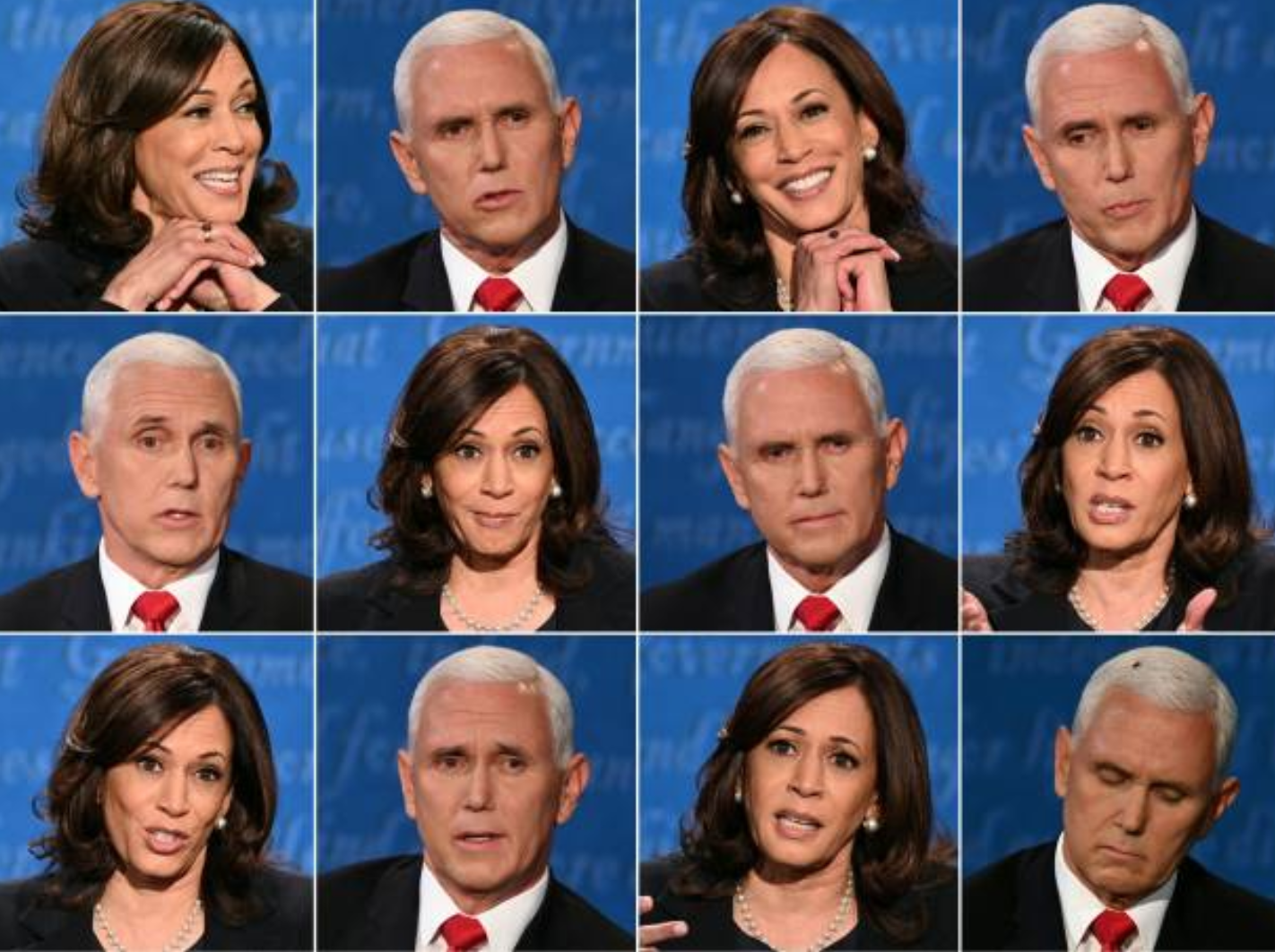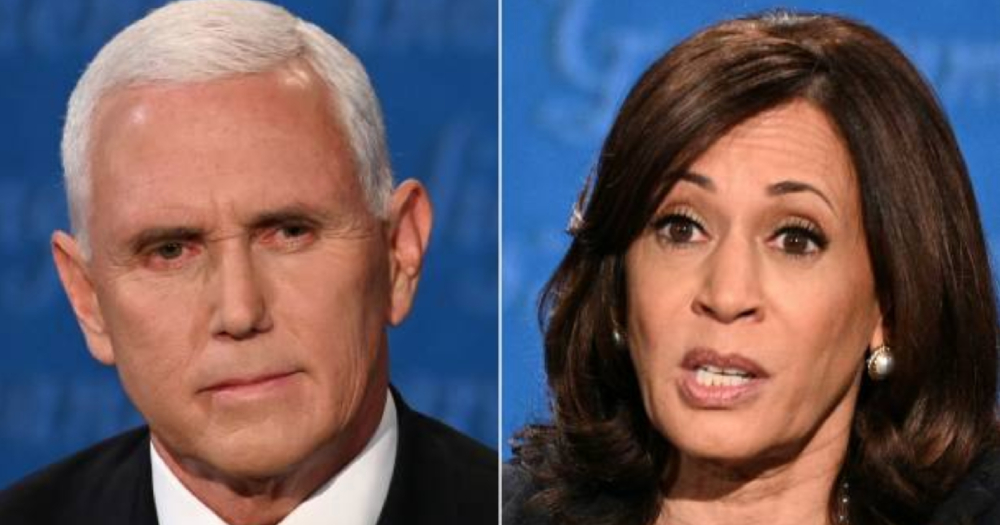The vice-presidential debate of the 2020 U.S. election took place on the morning of Oct. 8 (Singapore time), but it may not have impacted the race much.
No dramatic clashes but still notable
In contrast to U.S. President Trump and his challenger Joe Biden's fiery clash, the Mike Pence-Kamala Harris encounter was less bruising.
In many ways, it was a throwback to the pre-Trump era of politics, with fewer interruptions (although some still occurred) and personal insults from both candidates.
In the time since the first debate, there were the dramatic announcements that Trump had contracted Covid-19, his journey to Walter Reed hospital by helicopter, the news that he had been given an experimental antibodies treatment and steroids, his excursion out in a car, and his return to the White House that potentially risks the health of his staffers.
While there were no such fireworks in this debate, there was plenty to talk about.
1. Thanks to the moderator, both Pence and Harris avoided answering questions
The previous moderator Chris Wallace of Fox News was criticised for failing to control Trump and Biden's interruptions and personal remarks.
The VP debate moderator, Susan Page of USA Today, largely managed to get the candidates to answer within the stipulated time limits, made easier by the cooperation of the candidates themselves.
But viewers noticed that both Pence and Harris appeared to dodge some questions, and in some cases, ignore it entirely in favour of pivoting to their own talking points.
During a question on the Supreme Court, Harris did not give a definite answer of whether the Democrats intended to add more justices to the court if they won the election, despite Pence's pointed remarks.
Instead, she said the Supreme Court issue would be decided by the vote for president.
Pence himself also did not commit to an answer of whether Trump would peacefully hand over power if he lost the election, and instead said that he was confident that Trump was going to win.
2. Covid-19
Covid-19 dominated the discussions, having killed more than 210,000 Americans, and infecting even the president's inner circle.
Before the debate, reports came out that his adviser Stephen Miller, his press secretary Kayleigh McEnany and his debate prep coach Chris Christie had all tested positive for the virus.
Harris referred to the report by journalist Bob Woodward that Trump and Pence were informed of the deadliness of the virus, but Trump didn't publicly inform Americans until much later.
"They knew but they covered it up, they said it was a hoax, and today they still don't have a plan. Joe Biden does," said Harris.
Pence countered that Trump had shut down flights from China to buy "valuable time" and started Operation Warp Speed to accelerate research and development for a vaccine.
"Joe Biden plan has testing, getting PPE, which is all part of President Trump's plan, it looks a little bit like plagiarism," said Pence, apparently in reference to an incident in 1987 when Joe Biden used the words of British politician Neil Kinnock in a speech and did not credit him.
3. Playing it safe
As a black woman, Harris would have to deal with racial stereotypes that cast black women as angry and aggressive, while having to prove her competency on stage as black women typically face greater scrutiny in professional settings as compared to white men.
This was possibly why she avoided fact-checking Pence -- an opponent who appears mild-mannered -- which is a move that might come across as aggressive and negative to voters.
Harris would also more likely be picked apart by the audience should she make any mistakes, Politico opined, which might explain why she appeared to focus on retaining her composure and not making gaffes.
Still, she spoke up assertively at times, urging Pence not to interrupt her less than 15 minutes into the debate by saying, "Mr. Vice President, I'm speaking. I'm speaking, okay?"
By doing that, Harris offered an image of strength, especially to voters who want to see a strong woman candidate in politics.
As for Pence, especially at a time when more Americans think that white people were more advantaged in society than black people (according to a Pew Research Centre study), he might have focused on sticking to a policy-guided debate plan, rather than focusing on Harris' race or gender.
Pence did just that, repeating Republican talking points, such as Biden's record on China, even when he was not asked about these topics.
His collected and measured performance also offered a sharp contrast to Trump's performance at the presidential debate, which was chaotic at best as the two presidential candidates often interrupted each other and added more spectacle than substance.
To voters who were deterred by the Trump administration's handling of the Covid-19 pandemic -- made worse by the odd turn of events the last couple of days that included an outbreak at the White House -- Pence's low-key performance would seem more "normal" and could offer assurance that he was still a reliable Republican to vote for.
4. The memes
But perhaps the thing that really demonstrated how low-key this debate was, in comparison with Trump-Biden, was the explosion of memes when a fly landed on Pence's head at one point during the debate.
Within minutes (possibly even seconds) there were Twitter accounts and trending memes online.
The Biden campaign even took advantage, selling fly-swatters, registering a new website domain called flywillvote.com and tweeting this:
Pitch in $5 to help this campaign fly. https://t.co/CqHAId0j8t pic.twitter.com/NbkPl0a8HV
— Joe Biden (@JoeBiden) October 8, 2020
Meanwhile, Harris's meme-worthy facial reactions also took on a life of its own, with looks of incredulity at certain points when Pence was speaking.
 Image by Robyn Beck, Eric Baradat/AFP via Gety Images
Image by Robyn Beck, Eric Baradat/AFP via Gety Images
Reactions were, of course, polarised, with some admiring her while others felt she should have refrained from doing so:
Megyn Kelly scolds Kamala Harris on debate facial expressions: "Take it like a woman" https://t.co/JDWZ10KNih pic.twitter.com/ibpDz3fquK
— The Hill (@thehill) October 8, 2020
However, a significant fact is that the pool of undecided voters this year, this close to the election, has been smaller than in previous years.
In other words, more people have already decided whether they are going to vote for Trump or Biden, and it is unlikely that one vice-presidential debate will do much to change that, much like all other vice-presidential debates.
No change to this view at debates end. Both delivered content and performances that decided partisans will like. No minds changed and my timeline and responses support this assessment. https://t.co/HmhAlUsEOP
— Bruce Haynes (@BruceHaynesDC) October 8, 2020
Totally unrelated but follow and listen to our podcast here
Top image by RIC BARADAT,ROBYN BECK/AFP via Getty Images
If you like what you read, follow us on Facebook, Instagram, Twitter and Telegram to get the latest updates.
